|
|
|
Sort Order |
|
|
|
Items / Page
|
|
|
|
|
|
|
| Srl | Item |
| 1 |
ID:
181811
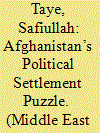

|
|
|
|
|
| Summary/Abstract |
The rapid collapse of the Afghan Republic in August 2021 was in part the result of two decades of disintegrating political parties at the hands of former Presidents Karzai and Ghani. After the 2001 US intervention, political parties did not play a significant role in the politics of Afghanistan. The country’s nascent democracy experienced major shifts in the aftermath of the US intervention, largely concerning the behaviour and structure of its parties, which impacted the government’s prospects of reaching a political settlement. In this period, politics began to shift toward a more elite-centric model. By applying a political settlement conceptual framework and case studies, especially with reference to the presidential elections, this article argues that the transformation to an elite-centric model intensified political rivalries in Afghanistan. The resulting polarisation consequently had decreased Afghanistan’s chances of reaching a political settlement, an essential component of state-building in this fragile, linguistically fragmented country with multiple politico-military factions.
|
|
|
|
|
|
|
|
|
|
|
|
|
|
|
|
| 2 |
ID:
191963
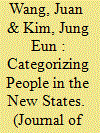

|
|
|
|
|
| Summary/Abstract |
What motivates states’ choice of social classification? Existing explanations highlight scientific beliefs of modern states or social engineering by ideological regimes. Focusing on the initial state-building period of two Communist regimes, China and North Korea, this article complements the existing literature and suggests that social classification reflects three missions of political leaders: regime distinction, governance, and power consolidation. Population categories are created to distinguish the new government from the old, to selectively provide welfare, and to attack political opponents. The varying weight of the missions and their manifestation in social classification depend on new ruling elites’ cohesion and past experiences. This comparative historical analysis sheds light on the rise of political chaos in China and the personalistic dictatorship in North Korea in the 1970s.
|
|
|
|
|
|
|
|
|
|
|
|
|
|
|
|
| 3 |
ID:
115611
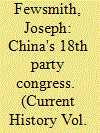

|
|
|
|
|
| Publication |
2012.
|
| Summary/Abstract |
Will the instinct to reinforce the rules of elite politics . . . undermine the leadership's ability to respond to the issues that Bo Xilai and the New Left aired?
|
|
|
|
|
|
|
|
|
|
|
|
|
|
|
|
| 4 |
ID:
162353
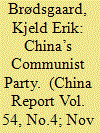

|
|
|
|
|
| Summary/Abstract |
The Communist Party of China (CPC) is not withering away as predicted by some Western scholars. On the contrary, in recent years, the party has centralised and strengthened its rule over China. At the same time, party membership has changed. Today, workers and farmers only account for only one-third of the total party membership compared to two-thirds when the People’s Republic of China (PRC) was established. Instead, new strata and groups such as technical and management personnel have evolved. The composition of the party’s cadre corps has changed accordingly, and cadres today are younger and much better educated than during Mao’s time. The leading cadres form an elite which is at the heart of a ranking-stratified political and social system. This article discusses how the CPC has evolved from a mass to an elite party. It argues that in this process, the party has taken over the state resulting in a merger and overlap of party and government positions and functions, thereby abandoning Deng Xiaoping’s ambidextrous policy goals of separating party and government. Centralisation and reassertion of ranking-stratified party rule is Xi Jinping’s answer to the huge challenges caused by the economic and social transformation of Chinese society—not a return to Mao’s mass party.
|
|
|
|
|
|
|
|
|
|
|
|
|
|
|
|
| 5 |
ID:
092373
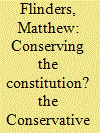

|
|
|
|
|
| Publication |
2009.
|
| Summary/Abstract |
In 2008 David Cameron declared that the Conservative party was 'ready for government' and suggested that 'the change we need is not just from Labour's old policies to our new policies… It's about a change from old politics to new politics'. This 'new politics' narrative is something of a cliché: British constitutional history reveals a regular pattern whereby opposition parties renege upon implementing far-reaching constitutional and democratic reforms once they win power. It is in this context that this article draws upon documentary analysis and a number of interviews to examine the Conservative party's position on constitutional reform and democratic renewal. It concludes that although the Conservative party has spent the last decade decrying the 'destruction' of the constitution it has undertaken little detailed preparatory work in relation to how it might seek to alter the governance of Britain. As a result the research presented in this article provides a number of insights into elite politics, strategic game-playing and executive veto capacities within a context of growing political disengagement from politics and falling levels of trust in politics.
|
|
|
|
|
|
|
|
|
|
|
|
|
|
|
|
| 6 |
ID:
162084
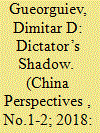

|
|
|
|
|
| Summary/Abstract |
President Xi Jinping is arguably the most powerful Chinese leader since Chairman Mao. Recent constitutional revisions and a midterm leadership reshuffle has only substantiated the fear that Xi, like Mao, has no intention of handing over power to a future successor. Does Xi’s rise signal an end to collective leadership and does a stronger president translate into a weaker party? In this article, I review the methods by which Xi has come to consolidate power as well as the implications for Chinese elite politics in the future. Drawing insights from the comparative literature, I question the zero-sum relationship between executive and institutional strength. Although Xi has certainly amassed unprecedented personal power, it has not necessarily come at the expense of the Party. Instead, the dangers of Xi Jinping’s power grab are more likely to result from a chilling effect on dissenting opinions and thinning out of the leadership pipeline, each of which is likely to undermine governing capacity over the medium to long-term.
|
|
|
|
|
|
|
|
|
|
|
|
|
|
|
|
| 7 |
ID:
153541
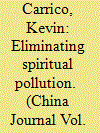

|
|
|
|
|
| Summary/Abstract |
Most histories have analyzed China’s 1983 Campaign to Eliminate Spiritual Pollution through the lens of elite politics. This article proposes a new interpretation of “spiritual pollution,” drawing upon anthropological theories of taboo and pollution to reinterpret the campaign’s role in reform-era culture and identity construction. The early reform era was a time of collapsing social borders that erased the obsessively delineated identities of the previous decades. Within this context, I reinterpret the struggle against spiritual pollution as an attempt to employ taboos to reinstate schematic boundaries in a world suddenly in flux. This process of post-Maoist boundary building particularly focused upon the distinction between “East” and “West,” as well as the distinction between the economic and political realms. The results of the campaign can still be seen today: the construction of a pure official identity based in overcoming Mao-era economic taboos alongside the perpetuation of political and cultural taboos.
|
|
|
|
|
|
|
|
|
|
|
|
|
|
|
|
| 8 |
ID:
183231
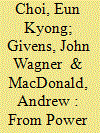

|
|
|
|
|
| Summary/Abstract |
Many China watchers argue that Xi Jinping has concentrated power in his own hands in a manner unprecedented since the death of Mao Zedong and Deng Xiaoping. This article tests the extent of Xi's power consolidation by comparing the strength of his faction during his time in power to similar periods under his two immediate predecessors, Jiang Zemin and Hu Jintao. Furthermore, we investigate whether a dominant faction is emerging under Xi Jinping, replacing the power balancing between factions that was the norm throughout the reform era. Analysing factional affiliations of Chinese leaders in the top four ranks, we find that Xi has formed a dominant faction. Through statistical analysis of the promotion chances of provincial leaders, we find that Xi has been unusually successful when compared to previous leaders at promoting his clients. This suggests that Xi has boosted the power of his faction by elevating provincial leaders to an extent not seen since the death of Mao and Deng.
|
|
|
|
|
|
|
|
|
|
|
|
|
|
|
|
| 9 |
ID:
168016


|
|
|
|
|
| Summary/Abstract |
The Chinese People’s Political Consultative Conference (CPPCC) system is a curious institution: often ridiculed as a decorative “flower vase” for the one-Party regime, or, at best, a networking club meant to appease elite groups, it does not attract much scholarly attention. The Communist Party leadership, however, clings adamantly to what it says is a “broadly representative” intermediary body helping with policy reform and United Front work. In this article, we investigate the validity of this original logic with the help of fresh empirical data. We look at the CPPCC’s institutional history, principles of member selection, delegates’ self-conceptualisation, and their modes of operation. Intermediation, it appears, has always been a blurry task for CPPCC members, resulting in a wide array of behavioural choices – from parroting of the Party line to attempts at proactive agenda setting. After more than two decades of relative openness to innovative bottom-up policy proposals, new rules of unified conduct now again stifle the consultative potential of the CPPCCs – but there seems to be some room for intermediary agency left, especially at the local level.
|
|
|
|
|
|
|
|
|
|
|
|
|
|
|
|
| 10 |
ID:
076677
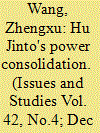

|
|
|
| 11 |
ID:
086983
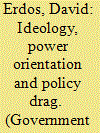

|
|
|
|
|
| Publication |
2009.
|
| Summary/Abstract |
Despite a Plethora of Jurisprudential Exegesis. There Remains almost no work examining the politics of the bill of rights debate in Britain from a political science perspective. Such a lacuna is unfortunate not only because this issue has come to occupy an important place within British political debate but also because understanding Bill of Rights developments such as the 1998 Human Rights Act is important in explaining the contours of both judicialization and the rights revolution as they pertain to the British Case.
|
|
|
|
|
|
|
|
|
|
|
|
|
|
|
|
| 12 |
ID:
164828
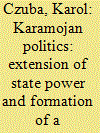

|
|
|
|
|
| Summary/Abstract |
State-making processes that occur in peripheral areas and the role that local political elites play in such processes have not been adequately explored by scholars. This article investigates these important phenomena through the lens of the Ugandan state’s presence in Karamoja, in the country’s northeast, which until the early years of the twenty-first century was very limited. Rapid extension of the power of the Ugandan state in the region, upon which the country’s rulers have embarked in the last decade, has radically altered existing governance arrangements in Karamoja and led to the formation of a subordinate Karamojan political elite. This elite has been instrumental in government efforts to establish control over the region’s population and shaped this state-making process in important ways.
|
|
|
|
|
|
|
|
|
|
|
|
|
|
|
|
| 13 |
ID:
145829
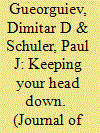

|
|
|
|
|
| Summary/Abstract |
During recent party congresses in China and Vietnam, two highly anticipated candidates for promotion were sidelined. In China, Bo Xilai was arrested for corruption and stripped of his party membership. In Vietnam, Nguyen Ba Thanh remained a provincial leader with little opportunity for promotion to the Politburo. Existing arguments about promotions under authoritarian rule are unable to explain these outcomes. In particular, both candidates were competent and well connected. This cuts contrary to the expectations of both performance-based promotion and factional promotion theories. We argue that these candidates were sidelined due to a previously under-theorized factor in promotion contests—their ability to mobilize personal followings. Amidst a literature that has focused almost exclusively on intra-elite conflict, we argue that elite–mass linkages are critical. In particular, the public profile of top leaders is important for regime legitimacy and mobilization. However, when individuals become exceptionally well known they become threats to the single-party system. We test this argument on promotions in China's 18th Party Congress in 2012 and Vietnam's 11th Party Congress in 2011, using original data on Internet search queries and media coverage among contenders for promotion. Our approach offers new insights into the strategies authoritarian politicians use to stay afloat as well as the mistakes that sink them when competing for power under one-party rule.
|
|
|
|
|
|
|
|
|
|
|
|
|
|
|
|
| 14 |
ID:
145826
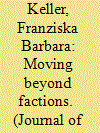

|
|
|
|
|
| Summary/Abstract |
Informal connections play an important role in regimes all across the world, but among China's political elite, it is particularly factional affiliation that is said to structure contention over who will rule and who will fall victim to a purge. This article identifies two approaches to measuring factional ties in the literature: the exploratory approach traces alliance ties through qualitative assessment of insider sources, while the structured approach uses publicly available data to infer factions from shared characteristics. The article combines the two by arguing that informal politics is better conceptualized as a process of alliance formation shaped by an underlying social (network) structure. Among the structured approaches, coworker networks best capture the latter, but this can be further refined by noting the number of instances of working together, or by taking into account promotions that have occurred while the two individuals were coworkers.
|
|
|
|
|
|
|
|
|
|
|
|
|
|
|
|
| 15 |
ID:
174961
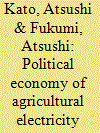

|
|
|
|
|
| Summary/Abstract |
Although electricity is one of the most important determinants of successful industrialization, many countries do not provide sufficient amounts of electricity at reasonable prices for industrialization. In order to inquire into the causes behind this, we investigate the factors that influence electricity tariffs for agricultural consumers at the state level in India. We conduct a dynamic panel data analysis using data for seventeen major states in India for the period from 1992 to 2012. Our estimation results suggest that as the Gini coefficient of landowning rises, the agricultural electricity tariffs become lower. However, the rural population share does not significantly affect agricultural electricity tariffs. These results indicate that state governments are responsive to the demands of large farmers (rural elites) but not to the demands of farmers more generally (rural masses). Our results are consistent with elite politics but not mass politics. Low electricity tariffs for agricultural consumers have caused insufficient investment in the infrastructure necessary for the expansion of industries, as well as high electricity tariffs for industrial consumers, which may have adversely affected the industrialization of state economies in India.
|
|
|
|
|
|
|
|
|
|
|
|
|
|
|
|
| 16 |
ID:
119180
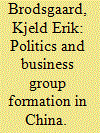

|
|
|
|
|
| Publication |
2012.
|
| Summary/Abstract |
As a result of economic reform and administrative restructuring in China, a number of powerful state-owned business groups ("national champions") have emerged within sectors of strategic importance. They are headed by a new corporate elite which enjoys unprecedentedly high levels of remuneration and managerial independence from government agencies and which derives legitimacy from symbolizing China's economic rise. However, through the nomenklatura system, the Party controls the appointment of the CEOs and presidents of the most important of these enterprises and manages a cadre transfer system which makes it possible to transfer/rotate business leaders to take up positions in state and Party agencies. In order to conceptualize the coexistence of the contradicting forces for further enterprise autonomy and continued central control that characterizes the evolving relationship between business groups and the Party-state, this paper proposes the notion of integrated fragmentation.
|
|
|
|
|
|
|
|
|
|
|
|
|
|
|
|
| 17 |
ID:
137912
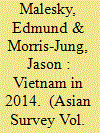

|
|
|
|
|
| Summary/Abstract |
The May 2014 entry of a Chinese deep-water oil rig into Vietnamese waters deeply shocked Vietnam. This yearend article chronicles the impact of the controversial action on (1) power struggles among elite politicians, (2) alterations in foreign policy orientation, and (3) popular opinion regarding economic reforms and emerging inequality.
|
|
|
|
|
|
|
|
|
|
|
|
|
|
|
|
|
|
|
|
|